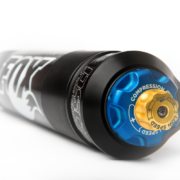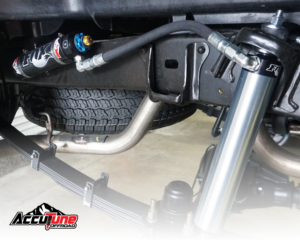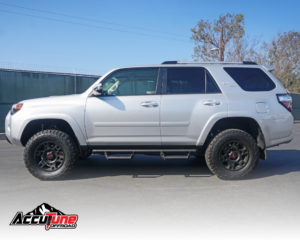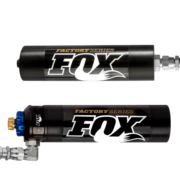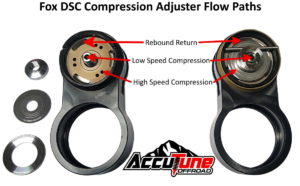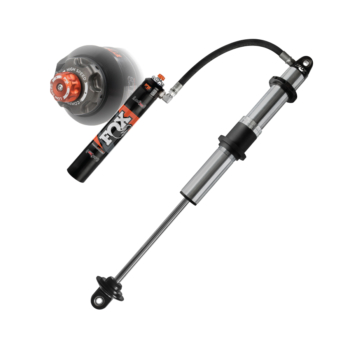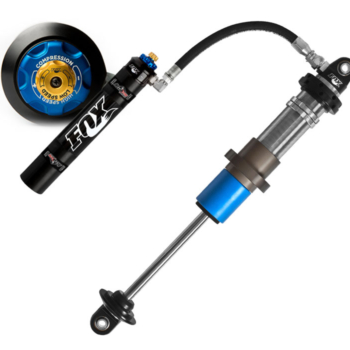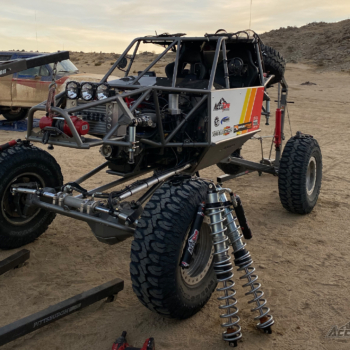Should I get FOX DSC Adjusters?
December 10, 2019
Fox includes Dual Speed Compression Adjusters (DSC) on their shocks and coilovers, giving you the ability to manually fine-tune both high and low-speed compression valving. This feature offers several benefits, which we’ll explore below.
Low Speed Compression
What is Low Speed Compression?
Low Speed Compression on a shock refers to the rate at which the shaft compresses into the shock body. It typically happens during cornering, braking, accelerating, or when driving over large rolling bumps. Since shocks must first react slowly to a bump before moving faster, low-speed compression can also be noticeable on high-speed bumps, especially if they are small and frequent (like washboard terrain) or if the valving is too stiff.
When would I need to adjust Low Speed Compression?
- If the vehicle feels bouncy or bottoms out on large rolling bumps, consider stiffening the Low Speed Compression on your DSC.
- For improved handling and to reduce brake dive, tighten the Low Speed Compression adjuster.
- If the ride is harsh on washboard roads or small bumps, soften the Low Speed Compression adjuster on your DSC.
- Low-speed adjustments on the DSC are highly effective and often the most useful for fine-tuning.
High Speed Compression
What is High Speed Compression?
High Speed Compression occurs when the shock compresses rapidly, typically in response to more aggressive impacts, such as hitting curbs, speed bumps, whoops, or similar obstacles. This isn’t necessarily tied to driving speed but to the intensity and quickness of the impact.
When would I need to adjust High Speed Compression?
- If the suspension and tires are bottoming out or slamming through hard impacts, you should increase the high-speed compression.
- Due to the design of the DSC’s internal components, high-speed compression adjustments are generally less noticeable or distinguishable compared to low-speed adjustments.
Do shocks with DSC adjusters need special valving?
Yes, the main piston valving and DSC work in tandem to determine the overall stiffness of the shock. The DSC acts as an additional restriction in the oil flow path, allowing for finer adjustments. However, the DSC can only increase stiffness, so the main valving must be set softer for optimal performance. If the main piston is too soft or slightly too stiff, the DSC won’t provide an ideal adjustment range. It’s important to note that the DSC adjuster only affects compression and cannot correct issues with harshness or softness related to rebound damping.
AccuTune Offroad specializes in tuning Fox Shocks equipped with DSC adjusters. We can tune a DSC shock for virtually any vehicle and any terrain. Contact us today to learn more about how we can assist you! Reach us at (424) 377-0808 or Sales@accutuneoffroad.com.
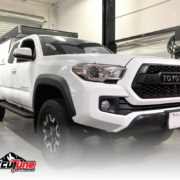
When would someone want a DSC adjuster on their shocks or coilovers?
Fox DSC adjusters allow you to fine-tune your shocks, making it easier to compensate for added weight, varying terrain, or more aggressive driving styles. Trucks and SUVs that tow or carry heavy loads can greatly benefit from DSC adjusters, as they offer the flexibility to have a softer tune for daily driving and a stiffer setting when carrying a load.
Overland vehicles, which frequently encounter fluctuating weight and terrain, also benefit from DSCs. When unloaded on the street, you may prefer a softer tune for a smoother ride, while off-road, you may want more control and comfort depending on the terrain (e.g., nuisance rocks vs. whoops) and load (empty vs. fully loaded).
For weekend warriors who daily drive their vehicles but also want to tackle challenging off-road terrain at high speeds, DSCs offer significant advantages. On the street, with maximum tire pressure, you may want to soften the tune for comfort. When off-roading, you can air down the tires to absorb smaller rocks and then stiffen the DSC adjusters to prevent bottoming out and improve vehicle control. DSC adjusters are commonly used on daily-driven vehicles like Toyota Tacomas, 4Runners, Ford F150s, and Raptors.
For solid axle vehicles with a tall center of gravity, more stiffness is required on the road to control the chassis. Off-road, however, a softer setup can help soak up small rocks and gravel. Lowering tire pressure can also aid in absorbing bumps and rocks on the trail.
Off-road race cars benefit from DSC adjusters because they allow for simple, quick tuning changes, enhancing the shock’s performance. For experienced teams, they provide the flexibility to make easy adjustments during the race or between tracks.
With just a few turns of the DSC adjuster, you can significantly improve ride quality, whether on the street, off-road, or while towing.
When would you not need DSC adjusters on your shocks?
DSC adjusters are not a necessary upgrade for customers who don’t plan to use or adjust them, and they’re not required for many applications. If your vehicle is primarily a daily driver and you do minimal off-roading, you may not need DSC adjusters. Similarly, if your vehicle’s weight is consistent and comfort is more important to you than performance, DSC adjusters may not be necessary. Essentially, the DSC adjuster is a convenient feature that helps you get the most out of your Fox shocks, offering enhanced customization when needed.
Can you upgrade shocks to have DSC adjusters?
Yes, you can upgrade shocks or coilovers to have DSC adjusters. However, you should really consider getting DSC adjusters on your shocks the first time around to save money. Upgrading to a DSC requires the entire remote reservoir to be replaced with a cylinder specifically designed to work with the DSC. In addition to a new remote reservoir with DSC, the shock should also be revalved.
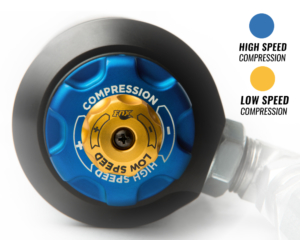
Making Adjustments to your Fox DSC Adjuster
High and low-speed compression adjusters may arrive set at random positions, so it’s a good idea to reset them all to the same setting. Start by opening all the adjusters fully and then drive the vehicle (in a safe location and at a safe speed) to establish a baseline of how soft the suspension feels. This will give you a starting point for fine-tuning the settings to suit your driving needs.
Start with Low Speed Compression:
- One click in of high speed compression is required before adjusting the low speed compression.
- Tighten the low speed compression until the handling meets your expectations.
- Two clicks are recommended for larger changes, while one click is typically enough for smaller adjustments.
- Low speed compression clicks can be difficult to feel on the dial, so adjustments may require some patience.
- The adjusters become more sensitive as they approach the fully closed position, making fine-tuning more precise at that setting.
-Don’t close it all the way before adjusting high speed
Adjust High Speed Compression Last:
- Tighten the high speed compression until the performance on big bumps is acceptable.
- This adjustment is not always necessary, depending on your driving style and terrain.
- When the low speed knob is near fully closed, it can act like a fine adjustment for more precise tuning.
- High speed compression clicks can be difficult to make due to the stiff adjuster, so be sure to apply steady pressure when making changes.
DSC Tech Tips:
- It’s normal for the DSC adjusters to remain fully open on street tunes, as this allows you to compensate for added weight.
- If your vehicle feels too stiff with the adjusters fully open, it may be necessary to revalve the main piston for better performance.
- If your vehicle feels too soft with the adjusters near the fully closed setting, you may also need to revalve the main piston to achieve the desired balance.
Related Fox Shocks With DSC Adjuster:
[/av_textblock]

